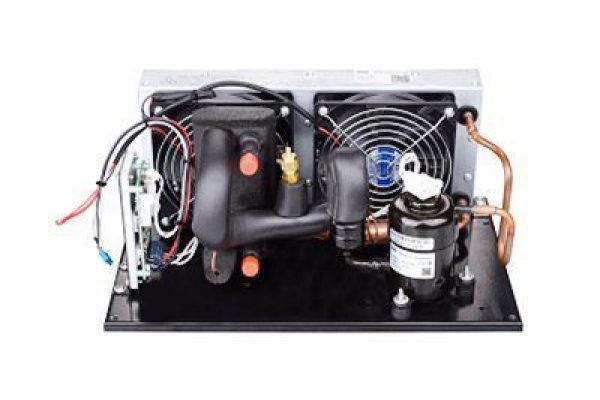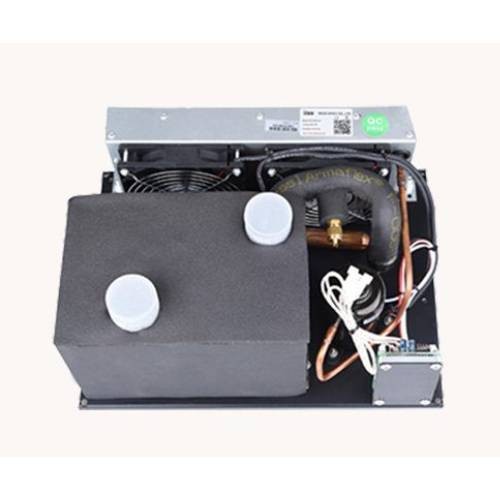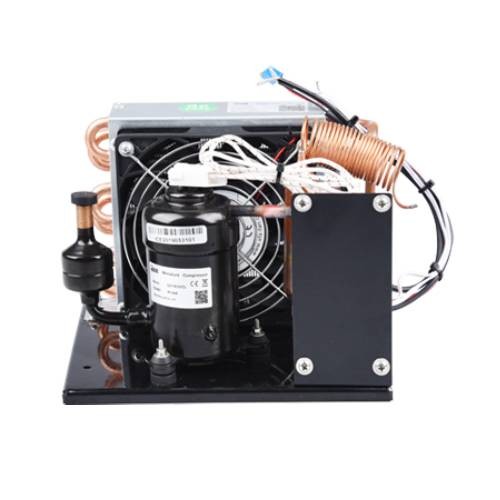Introduction

In the fast-paced world of AI and ML, efficient cooling solutions are crucial for maintaining optimal performance. Understanding liquid cooling for AI and ML is essential in maximizing the potential of these technologies. Liquid cooling offers numerous advantages, such as improved thermal performance and energy efficiency, making it a preferred choice for AI and ML applications.
Understanding Liquid Cooling for AI and ML
Liquid cooling involves using a liquid coolant to transfer heat away from electronic components, such as AI chips, to maintain their operational temperatures. This method is particularly beneficial for high-performance computing systems, where traditional air cooling may not suffice.
The Importance of Efficient Cooling Solutions
Efficient cooling solutions play a vital role in ensuring the stability and reliability of AI and ML systems. As these technologies continue to advance, the demand for innovative cooling solutions becomes increasingly significant to prevent overheating and potential damage to hardware.
Advantages of Liquid Cooling for AI and ML
The advantages of liquid cooling for AI and ML are manifold. It offers superior thermal conductivity, reduced noise levels, and enhanced overall system performance compared to traditional air-cooling methods. Additionally, liquid cooling allows for more compact designs, making it ideal for space-constrained environments.
What is Liquid Cooling for AI and ML?

"Arctic Active Cooling. Endless Possibilities. We capture new technologies in mobile and compact cooling. Full-size cooling in a miniature design, customized to make your device stand out with innovative thermal management."
Exploring the Basics of Liquid Cooling
Liquid cooling for AI and ML involves using a specialized cooling system that uses liquid, typically water, to dissipate heat from high-performance computing components. This method is designed to efficiently cool down the heat generated by powerful AI and ML systems, ensuring optimal performance and longevity.
How Liquid Cooling Differs from Traditional Methods
Unlike traditional air cooling methods, liquid cooling offers a more efficient way to manage heat dissipation in AI and ML systems. By using water as a coolant, liquid cooling can effectively remove heat from components at a faster rate, preventing overheating and maintaining consistent performance even under heavy workloads.
Benefits of Implementing Liquid Cooling Solutions
Implementing liquid cooling solutions for AI and ML systems comes with several advantages. These include improved thermal performance, reduced noise levels, enhanced energy efficiency, and the ability to accommodate higher power densities. Additionally, liquid cooling allows for more compact designs and greater flexibility in system configurations.
Arctic Active Cooling's Mini Water Chiller

Arctic Active Cooling's Mini Water Chiller is a compact and efficient refrigeration system designed specifically for AI and ML applications. It features a high-efficient refrigeration mini compressor with R134a coolant, a small condenser, plate evaporator, filter drier, and drive board, all integrated into one unit for easy installation. This sophisticated design ensures the latest micro cooling solutions for end users.
Features of the Mini Water Chiller
The Mini Water Chiller stands out with its innovative design that allows for seamless integration with existing AI and ML systems. Its small size makes it ideal for space-constrained environments, while its high-efficiency components ensure optimal cooling performance. Additionally, the inclusion of a drive board enables users to control compressor speed for customized cooling solutions.
Advantages of Using Arctic Active Cooling's Solution
One of the key advantages of using Arctic Active Cooling's Mini Water Chiller is its ability to provide reliable and consistent cooling for AI and ML systems. The high-efficiency refrigeration components ensure stable temperatures even under heavy workloads, contributing to enhanced system performance and longevity. Moreover, its compact design allows for flexible installation options in various AI and ML setups.
Customization Options for Different AI and ML Systems
Arctic Active Cooling offers customization options to tailor the Mini Water Chiller to specific requirements of different AI and ML systems. Whether it's adjusting compressor speed or integrating additional control features, the flexibility provided by this solution ensures that it can meet the unique cooling needs of diverse applications.
With Arctic Active Cooling's Mini Water Chiller, AI and ML systems can benefit from reliable and efficient liquid cooling solutions that are tailored to their specific needs. The advanced features of this solution enable seamless integration into existing setups while providing consistent temperature control for optimal performance.
Does AI Need Water Cooling?

The Demands of AI Workloads on Cooling Systems
As AI and ML applications continue to advance, the demand for high-performance computing and efficient cooling solutions has become increasingly critical. The intense workloads generated by AI algorithms require robust cooling systems to maintain optimal performance and prevent overheating. Liquid cooling solutions have emerged as a viable option to meet these demands, offering superior thermal management for AI chips and processors.
Efficiency of Water Cooling for AI Chips
Water cooling has proven to be highly efficient for cooling AI chips, delivering superior heat dissipation compared to traditional air cooling methods. By utilizing a liquid coolant, such as Arctic Active Cooling's Mini Water Chiller with R134a coolant, heat can be rapidly transferred away from the components, ensuring consistent and reliable operation even under heavy workloads. This enhanced efficiency contributes to improved overall system performance and longevity.
Comparing Liquid Cooling with Air Cooling for AI Applications
When comparing liquid cooling with air cooling for AI applications, it becomes evident that liquid cooling offers several distinct advantages. While air cooling may suffice for basic computing tasks, the complex nature of AI workloads demands more advanced thermal management solutions. Liquid coolers provide superior heat dissipation capabilities and can maintain lower operating temperatures, resulting in enhanced stability and reliability for AI systems.
What is the Most Efficient Cooling for AI Workloads?

Evaluating the Efficiency of Liquid Cooling Systems
When evaluating the efficiency of liquid cooling systems for AI and ML workloads, it's essential to consider factors such as energy consumption, heat dissipation, and overall performance. Liquid cooling solutions offer a more efficient way to manage heat generated by high-powered AI chips, ensuring optimal system operation and longevity. By harnessing the thermal conductivity of liquid coolant, these systems can effectively dissipate heat from AI workloads, leading to improved efficiency and performance.
Impact of Efficient Cooling on AI Performance
Efficient cooling plays a crucial role in enhancing AI performance by maintaining optimal operating temperatures for AI chips. With liquid cooling solutions, the consistent removal of heat ensures that AI systems can operate at peak performance without the risk of overheating or thermal throttling. This directly impacts the speed and accuracy of AI computations, ultimately leading to improved productivity and reliability in handling complex machine learning tasks.
Considerations for Choosing the Right Cooling Solution
When selecting a cooling solution for AI workloads, it's important to consider factors such as scalability, maintenance requirements, and compatibility with existing infrastructure. Liquid cooling offers a versatile option that can be tailored to specific AI applications, providing flexibility in deployment and integration with different system configurations. Additionally, considerations should be made regarding Arctic Active Cooling's Mini Water Chiller as a viable solution due to its compact design and customizable features that align with various AI and ML system requirements.
By incorporating efficient liquid cooling solutions into AI and ML systems, businesses can unlock their full potential while ensuring reliable performance under demanding workloads. The advancements in liquid cooling technology continue to drive innovation in this space, offering promising opportunities for future developments in optimizing AI cooling systems for enhanced efficiency and productivity.
Liquid Cooling Data Center

Implementing Liquid Cooling in Data Centers
Liquid cooling for AI and ML applications has become increasingly popular due to its ability to efficiently dissipate heat generated by high-performance computing systems. Implementing liquid cooling in data centers involves integrating specialized cooling solutions that utilize liquid as the medium for heat transfer, ensuring optimal temperature regulation for AI and ML hardware.
Optimizing Energy Efficiency with Liquid Cooling
One of the key advantages of liquid cooling data centers is the significant improvement in energy efficiency. By using liquid as a coolant, heat can be more effectively removed from the system, reducing the overall energy consumption required for cooling. This not only results in cost savings but also contributes to a greener and more sustainable approach to data center operations.
Furthermore, liquid cooling systems can be optimized to operate at higher temperatures, which reduces the need for additional energy to maintain a low temperature environment. This allows data centers to operate more efficiently and reduces the overall carbon footprint of the facility. Additionally, liquid cooling can enable higher density computing, meaning more processing power can be packed into a smaller space, further maximizing energy efficiency and reducing the environmental impact of data center operations.
Overcoming Challenges in Liquid Cooling Data Centers
While liquid cooling offers numerous benefits, there are challenges that need to be addressed when implementing this technology in data centers. These include potential concerns about leakage, corrosion, and maintenance of the liquid cooling infrastructure. However, advancements in design and materials have led to innovative solutions that mitigate these challenges, making liquid cooling a viable option for data center environments.
While concerns about leakage, corrosion, and maintenance are valid, the industry has seen significant progress in addressing these issues. New liquid cooling systems are designed with multiple layers of protection to prevent leaks and corrosion, such as double-walled tubing and advanced sealants. Additionally, maintenance has been streamlined through automated monitoring and predictive analytics, reducing the need for manual intervention and making it easier to manage the infrastructure.
Conclusion

In conclusion, when it comes to AI and ML liquid cooling solutions, it is crucial to choose the right one for efficient performance. The Arctic Active Cooling's Mini Water Chiller offers a high-efficient refrigeration mini compressor with R134a coolant, making it an ideal choice for customers looking for sophisticated micro cooling solutions. With the ability to integrate or assemble with different machines or equipment, this solution provides flexibility and control over compressor speed for optimal performance.
Choosing the Right Liquid Cooling Solution
When selecting a liquid cooling solution for AI and ML applications, it is essential to consider factors such as efficiency, ease of installation, and customization options. The Arctic Active Cooling's Mini Water Chiller stands out with its integrated design and user-controlled compressor speed, making it a top choice for those seeking reliable and adaptable cooling solutions.
In addition to efficiency and ease of installation, it is crucial to consider the scalability of a liquid cooling solution for AI and ML applications. The Arctic Active Cooling's Mini Water Chiller offers the flexibility to scale up or down based on the specific cooling needs of a system, making it an ideal choice for businesses with evolving computational requirements. This adaptability ensures that the cooling solution can grow alongside the AI and ML infrastructure, providing long-term value and performance.
Future Trends in AI Cooling Systems
As technology continues to advance, future trends in AI cooling systems are expected to focus on enhancing energy efficiency and scalability. Liquid cooling solutions are likely to evolve further to meet the increasing demands of AI workloads while minimizing environmental impact. One potential trend is the development of more efficient and compact liquid cooling systems that can be easily integrated into existing data centers without requiring extensive modifications. Additionally, advancements in materials science may lead to the creation of more sustainable and eco-friendly cooling fluids that reduce the overall carbon footprint of AI infrastructure.
Advancements in Liquid Cooling Technology for AI and ML Applications
The advancements in liquid cooling technology for AI and ML applications are driving innovation in data centers and high-performance computing environments. With a focus on optimizing energy efficiency and overcoming challenges associated with traditional air cooling methods, liquid cooling continues to pave the way for improved performance in AI workloads.
Remember that choosing the right liquid cooling solution is crucial for ensuring optimal performance in AI and ML applications. As technology progresses, future trends will continue to shape the landscape of AI cooling systems while advancements in liquid cooling technology drive innovation in this space.
